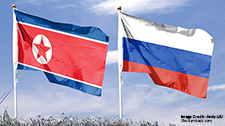North Korea Is Joining China and Russia in Confronting the US

Sangsoo Lee
Introduction:
The US is currently facing challenges from its adversaries in Northeast Asia: Russia’s invasion of Ukraine, China’s military build-up on the Taiwan Strait and the Democratic People’s Republic of Korea’s (DPRK or North Korea) ongoing testing of advanced missiles.
As military tensions between the US and North Korea’s greatest allies, China and Russia, grow, Pyongyang has unequivocally supported Moscow and Beijing through sharpened criticism of US policy. North Korea, in a commentary on the Foreign Ministry’s website this week, expressed its clear position on Russia’s invasion of Ukraine and the US-China confrontation in the Asia-Pacific region. North Korea defended Russia and blamed the US as the “root cause of the Ukrainian crisis” since the US disregarded “Russia’s reasonable and just demand…for security.”[1] Similarly, North Korea has also lambasted the US for its intention to refurbish its long-term plan to isolate China in the Asia-Pacific region.
Moreover, as strategic competition between the US and China has grown, both countries have sought to recruit ideological allies in their race against each other for global hegemony. Biden’s strategy for deterring China’s military rise has been to strengthen US alliances in Asia. However, the net effect of US efforts to strengthen ties with South Korea and Japan has been a convergence of interests and strengthened cooperation among China, Russia and North Korea. These developments all seem to suggest an emerging strategic triangle aimed at reducing US influence in the region and promoting a multipolar international system.
Related Publications
-
ISDP Annual Report 2023
ISDP’s Annual Report for the year 2023. We look back on 2023, a year in which tensions and conflicts captured the strategic space in ISDP’s focus areas, making headlines around […]
-
What Comes Next for North Korea-Russia Relations?
North Korea and Russia have taken their relations to a new level after the leaders of the two countries held an in-person summit meeting on Wednesday. While Pyongyang and Moscow […]
-
South Korea’s Indo-Pacific Strategy, Atmanirbhar Bharat, and the IPEF: Convergence and Commonality
For some time now, the existing multilateral networks such as those of the United Nations (UN) system have been largely ineffective in providing good global governance and helping create resilience, […]
-
Risk Reduction and Crisis Management on the Korean Peninsula
The situation on the Korean Peninsula is inherently intertwined with the growing instability of the East Asian security environment, where high tensions significantly increase the risk of unintended incidents and armed […]
-
Washington Declaration: Beyond Korea, What it Means for India?
In April 2023, South Korea and the United States released the Washington Declaration to reiterate and upgrade their treaty alliance. In outlining a joint nuclear deterrence strategy, the Declaration reaffirmed […]




